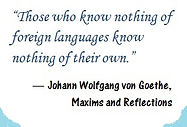Bilingüismo
LANGUAGE PRESTIGE
Definition: “A language or variety is said to have linguistic prestige if it is highly valued. Social and linguistic prestige is interrelated. The language of powerful social groups usually carries linguistic prestige: and social prestige is often granted to speakers of prestige languages and varieties.” [Source: The Routledge Dictionary of English Language Studies]
However, in order to understand this concept, we should distinguish between two types of prestige:
-
Linguistic prestige: It studies the concept of prestige within an only region.
-
Sociolinguistic prestige: It studies the concept of prestige through the comparison of different societies. Moreover, it depends on factors such as the social class or occupation of the speaker.
Factors that determine the linguistic prestige
A language itself has no prestige as it is a way of communication. But there are some elements that give the language its importance.
-
Cultural factors: A language can acquire its prestige depending on the cultural level of the countries where it is spoken. Additionally, in many cases, we have to take into account that sometimes there are cultures that can influence others near them.
-
Religious factors: A religion’s language acts as a link between all its members. Because of this, Latin is still important nowadays.
-
Geographic/social factors: The more territories a nation owns, the more speakers of its language would exist and more prestige a language will acquire. This can be seen in the case of Chinese.
-
Economic/political factors: The prestige of the language may be affected by the economic and political power of its territories.
[Source: Alcalá, Antonio. El concepto de Corrección y Prestigio Lingüístico. Pág 13. 1ra Ed, México, 1972]
Although it cannot be determined which languages are more prestigious than others because of the variety of causes, there are some rankings that show the most influential languages around the world. Examples:
Ranking from 2012
1-English; 2- French; 3- Spanish; 4-Arabic; 5-Mandarin; 6- Russian; 7-Portuguese;
8-German; 9- Japanese; 10- Hindustani
[Source: http://list25.com/the-25-most-influential-languages-in-the-world/4/]
Ranking from 2015
1-Mandarin; 2-Spanish; 3-English; 4-Hindi; 5-Arabic; 6-Portuguese; 7-Bengali;
8-Russian; 9-Japanese; 10- Punjabi
[Source : http://irisharoundoz.com/blog/2015/11/16/most-spoken-languages-in-the-world/]
The changes in the rankings suggest that the prestige of a language is not always the same but it varies over time. However, the prestige of a language can depend not only on the causes mentioned above, but also on the vision that a culture has about it; some languages can be considered less prestigious than others due to the misconceptions of the country’s culture. In the case of Spanish, we find that Spanish culture tends to be identified with bullfighting, party (fiesta), napping (siesta) and flamenco. This idea may discredit the language, although ironically, as the rankings above show, Spanish is one of the most prestigious languages in the world. Other clear example is the case of Japanese. This language is always initially believed of being so difficult to learn that it loses so much of its prestige, as no one feels confident to try it.
[Source: http://listverse.com/2015/04/29/10-myths-and-misconceptions-about-world-languages/]
Moreover, different cultures can consider prestigious the same language or others. For instance, Moroccans consider French more prestigious than English while Spanish people think the opposite. At the same time, although there are languages that are highly valued, such as Russian or Mandarin, perhaps the access to study them is not as easy as to other languages less prestigious.

